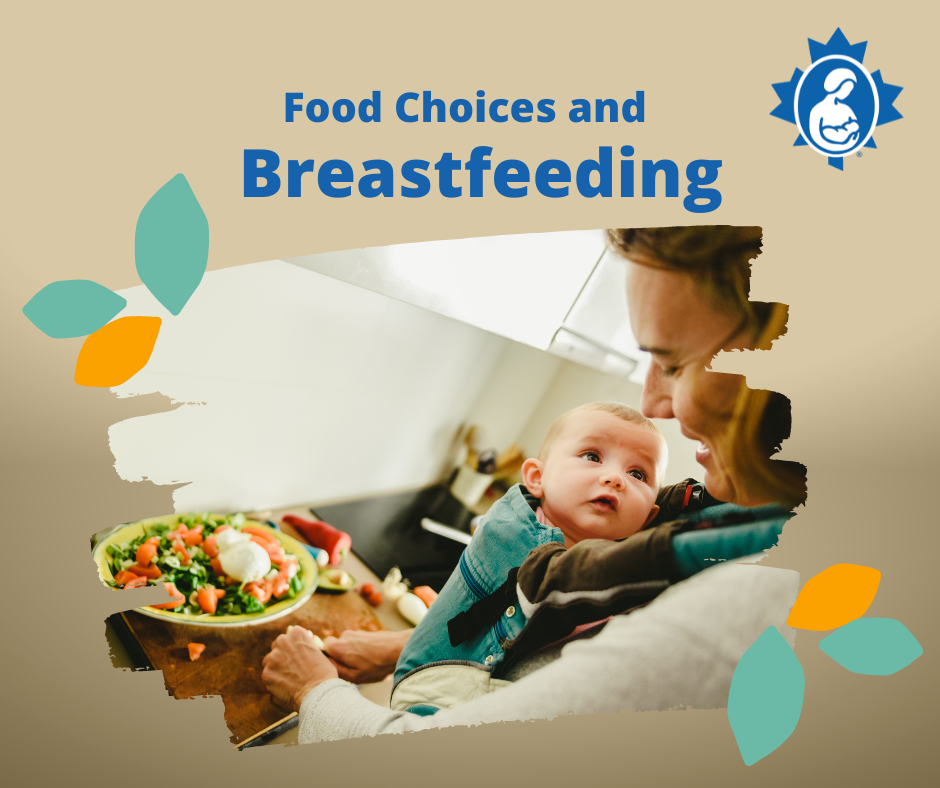
Around the world nursing mothers eat the foods of their culture. Your baby is introduced to the taste of the foods you eat while he is still inside your body. Once he is born, the flavours of the food you eat will pass into your milk. This introduces your baby to the tastes from your family table long before he begins solid food. This “sampling” of these tastes through your milk encourages your baby to accept them when they are put on his plate. So go ahead and enjoy the spices, garlic and onions you love! Your baby will enjoy them too!
How many extra calories do I need to eat to breastfeed my baby?
It takes about 400-500 extra calories every day to make the milk your baby needs. Some of the weight you gained during pregnancy can be used to provide the extra calories you need to make milk.
What should I eat?
Ideally, you will have access to a well-balanced diet of a variety of foods in as close to their natural state as possible.
Every day, choose a variety of:
- vegetables and fruit, including:
* dark green vegetables such as kale and bok choy each day
* orange vegetables such as carrots and sweet potato most days
- whole grain foods, such as:
* oats
* wild rice
* whole wheat pasta
- protein foods such as:
* eggs
* nuts and seeds
* fish and shellfish
* beans, peas, and lentils
* lean red meats, including wild game
* lower fat dairy products such as milk and yogurt
* fortified soy beverages, tofu, soybeans and other soy products
- healthy fats such as:
* nuts
* seeds
* fatty fish
* vegetable oils
Choose foods and drinks that have little to no added:
- sodium
- sugars
- saturated fat
Health Canada also recommends breastfeeding mothers:
- Take 400 IU of vitamin D daily
- Take a multivitamin daily
- Limit intake of fish containing mercury
Do I need to eat extra nutritious food to have good milk?
You do not need to eat any special foods or be concerned if you don’t eat a balanced diet every day. Nature ensures that your baby gets the right amount of nutrients automatically by using vitamins stored in your body as needed. It’s important for all women to eat healthy food for themselves and for their babies. The types of fatty acids found in your milk are influenced by what you eat. If you eat a diet high in unsaturated fats (fish, nuts, seeds & plant oils), your milk will be higher in unsaturated fats than mothers eating diets higher in animal (saturated) fats. This is a normal variation.
How do I know if my milk is rich enough for my baby?
Human milk is designed with all the nutrients in the right proportions for human babies. Mothers all over the world, eating many types of foods, have similar nutrients in their milk. If a mother is very malnourished, her milk can have low amounts of some nutrients, but this is extremely rare in Canada.
Can people on a vegan diet breastfeed?
Yes. Please see Vegan Diet and Breastfeeding for more information.
What about health-related dietary issues?
Mothers who have nutrient absorption issues due to Crohn’s disease or gastric by-pass surgery, or who have diets limited by other disorders or choices, should consult with their healthcare professional. Parents in these situations should be able to nurse as long as they get enough calories and all the vitamins and nutrients they need, either from food or supplements.
Are there foods I should avoid eating while breastfeeding?
Interestingly, different cultures have different ideas about what foods should not be eaten by breastfeeding mothers. Often a food that is discouraged for breastfeeding mothers in one culture is encouraged in another culture. It can be helpful to remember that most foods are eaten by nursing parents somewhere in the world! Most mothers find they can eat whatever foods they normally enjoy.
As you learn about your baby, you may wonder if a particular fussy period, or a rash or a change in your baby’s poop was caused by something you ate or if your baby is allergic to your milk. Your baby cannot be allergic to your milk. It is made specifically for her. If your baby has a particularly fussy period after you’ve eaten a meal of beans or broccoli, it is most likely a simple coincidence rather than your baby reacting to what you have eaten. However, it is possible that your baby is sensitive to something you have eaten.
The way to know whether or not your baby is reacting to something you have eaten is to watch your baby. It can be helpful to keep a food diary, writing down what you eat and your baby’s behaviour. If you begin to see a connection between a particular food and your baby’s behaviour, you can try cutting out that food for a period of time (usually at least 2 weeks) to see if that improves things. Different foods need longer than others to be completely eliminated from your body. Consult your healthcare provider or dietician for information on how to conduct a food elimination experiment. If you do not notice any improvement, contact your local La Leche League Leader for more information.
Please consider supporting LLLC.
Reference:
Health Canada. (2022, May 3). Healthy eating when pregnant and breastfeeding. canada.ca
Updated 2024
